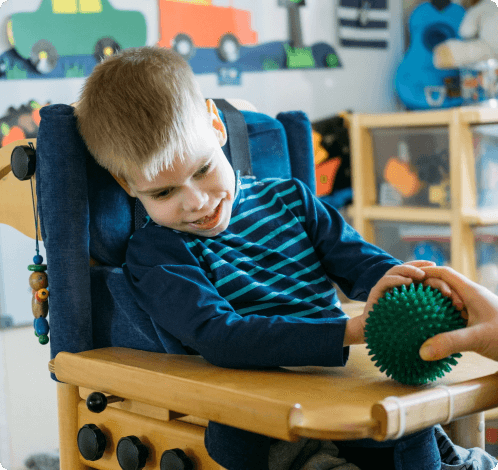Our Services
Special Needs Care
At Umbrella Home Care, we understand, and we have extensive experience caring for clients with special needs. Our goal is to ease the workload for families and make enjoyable experience for the clients.

Our Services
At Umbrella Home Care, we understand, and we have extensive experience caring for clients with special needs. Our goal is to ease the workload for families and make enjoyable experience for the clients.
Clients with special needs care in our community are close to our heart. We understand the stress that family and friends go through to accommodate the loved one’s needs as much as possible. At Umbrella Home Care, we intend to give dignified care for special needs clients. Our staffs work hard to learn individual client’s care needs and their values and provide the best care possible.

Respite Care
You can utilize this time, all by yourself, without being worried about your loved one. You will not have to worry about finding someone who is qualified to replace your selfless devoted care for the duration of the respite.
24/7 care / Live-in caregivers
Not a lot of other companies offer the option of 24/7 or live-in caregivers anymore. But in Umbrella Home Care, we believe that it is important to accommodate the client and family needs as much as possible. 24-hour shift-rotating or live-in caregiver option is available upon request!
Housekeeping assistance
Providing social support. Encouraging clients to involve in meaningful and appropriate activities.

There are no preset care plans to fit your needs; we start from scratch for everyone and build individualized care plan. Each client and family hold different values and beliefs. At Umbrella Home Care, you will meet someone who is compassionate to understand your unique situation and try to accommodate your needs as best as possible. We train our staffs accordingly and provide best quality care.
Who do you provide special needs care for?
We have the training, compassion, and experience to provide care for individuals with Down Syndrome, autism, ADHD, autoimmune conditions that interrupt neurological functions, and any other disorders that cause developmental delays and/or physical disabilities.
Who needs special care at home?
Special needs care at home is beneficial for families who need housekeeping assistance, respite care, and a shift-rotating caregiver option. We can provide care for individuals with any developmental, physical, sensory, cognitive, and behavioural conditions.
How do you take care of a child with special needs?
At Umbrella Home Care, we meet with families first to get a clear understanding of their child’s needs and diagnosis. There are no set care plans as we create individualized plans for each family, depending on what type of care and support they and their child need.
Generally speaking, families come to us for respite care and caregiving shift rotation, which can include doing activities, feeding, bathing, dressing, companionship, light housekeeping duties, and more.
What is the most important thing when caring for children with special needs?
At Umbrella Home Care, we believe the most important thing when caring for children with special needs is to see the child first. Children with special needs are children first and have the same needs as other children, including playing, learning, feeling safe and comfortable with their caregivers, and having a childhood full of positive and wonderful memories and experiences.
What is the behaviour of a child with special needs?
Behaviour can vary greatly with each child, even with the same diagnosis. The range of differences is why it’s so important to meet with families first, understand the child, and get to know the child’s personality so that we can create a personalized care plan. Generally speaking, children with special needs can be impulsive, struggle with paying attention and go through several mood swings. As caregivers, it’s important for us to be patient and compassionate when caring for children with special needs.
What are some good activities for children with special needs?
Card games, arts and crafts, music, dancing, sports, baking, board games, going to the playground, visiting a zoo, a science centre, or museum or all great activities for children. These activities can help with cognitive development, confidence, speech, motor skills, creativity, and social skills.
How do you communicate with special needs patients?
It’s important to communicate with special needs patients normally, as any changes in tone or ‘baby talk’ is unnecessary and can be degrading. Use a normal tone of voice and speak politely and patiently. We make sure to speak directly to the person rather than their caregiver or family member. Each person with special needs has different communication needs, and we make sure to check with family members and other caregivers on any communication specifics.
What is the best method to teach children with special needs?
The ‘best’ method depends on the child and what their abilities are. As home caregivers, we communicate with families about what their expectations are when it comes to teaching their child or children with special needs.
Generally speaking, their teachers and school program provide children with adequate learning opportunities. Our role as caregivers is to support the family.